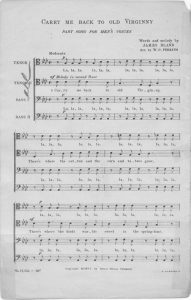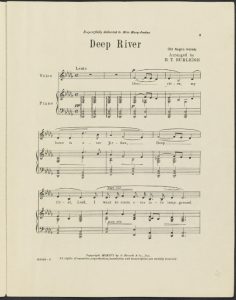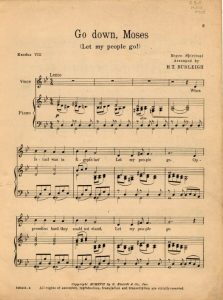Since the beginning of African American music, the genre has evolved many times due in part to outside influences from other cultures and societal changes in America. Sorrow Songs became spirituals, which would eventually merge with western classical music. James Bland and H.T. Burleigh were some of the most influential African American composers in America during the turn of the 20th century. Due to their western education, they were able to effectively popularize and represent African American spirituals by combining the words and themes of spirituals with western classical compositions and arrangements.
 James Bland was an African American minstrel performer and composer, some of his most famous compositions were “Carry me back to old Virginny” and “In the evening by the moonlight”. “Carry me back to old Virginny” is written from the perspective of a freedperson wanting to go back to the days of slavery. In this recording, the song is sung by a quartet of male singers and when reading the lyrics, the perspective of the singers seems to be that being enslaved wasn’t as bad as one might think. Although the song represents an African American point of view, the arrangement of the song is more western, with clear voicings for each member and more harmonized than previous forms of African American music which wouldn’t normally have this organized form.
James Bland was an African American minstrel performer and composer, some of his most famous compositions were “Carry me back to old Virginny” and “In the evening by the moonlight”. “Carry me back to old Virginny” is written from the perspective of a freedperson wanting to go back to the days of slavery. In this recording, the song is sung by a quartet of male singers and when reading the lyrics, the perspective of the singers seems to be that being enslaved wasn’t as bad as one might think. Although the song represents an African American point of view, the arrangement of the song is more western, with clear voicings for each member and more harmonized than previous forms of African American music which wouldn’t normally have this organized form.
The integration of western classical music into African American spirituals was even more apparent in Bland’s “In the evening by the moonlight”, a song about the experience of slaves. This recording starts with a western orchestral intro and much like the previously mentioned song, there is a lot more structure and harmonization in this piece. Interestingly, the pronunciations in the recording are also more “proper” English, rather than the English that was originally written in the lyrics.
 H.T. Burleigh was surrounded by music from a young age, performing at local churches and events and later became famous for his adaptations of African American spirituals. Some of his most famous works are “Deep river” and “Go down Moses”. “Deep river” is a song of hope that expresses a desire for peace and freedom. From the sheet music, we can see that the piece begins with piano chords that this is not a traditional spiritual that might have been passed orally, rather it is a well notated piece meant to express the experiences of African Americans in a western style.
H.T. Burleigh was surrounded by music from a young age, performing at local churches and events and later became famous for his adaptations of African American spirituals. Some of his most famous works are “Deep river” and “Go down Moses”. “Deep river” is a song of hope that expresses a desire for peace and freedom. From the sheet music, we can see that the piece begins with piano chords that this is not a traditional spiritual that might have been passed orally, rather it is a well notated piece meant to express the experiences of African Americans in a western style.
 The lyrics in “Go down Moses” don’t specifically relate to African Americans or even America, however, it was still meant to express many of the feelings of enslaved African Americans. When listening to this recording and looking at the sheet music, the accompanying parts are very intricate and western compared to what traditional spirituals might have done. Moreover, this song seems to have a structure where rather than having a call and response with other singers, the accompaniment has short interjections that just continue the melody.
The lyrics in “Go down Moses” don’t specifically relate to African Americans or even America, however, it was still meant to express many of the feelings of enslaved African Americans. When listening to this recording and looking at the sheet music, the accompanying parts are very intricate and western compared to what traditional spirituals might have done. Moreover, this song seems to have a structure where rather than having a call and response with other singers, the accompaniment has short interjections that just continue the melody.
I think that another important note that all of these recordings have in common is that the vocalists all seem to be classically trained compared to previous African American music where the performers weren’t necessarily trained. The main causes of this seem to be the notation of the music as well as more western influence. In my opinion, the notation of spirituals has prevented them from being lost to time or lack of representation, however, bias can also affect which spirituals get notated and which will be forgotten. The integration of western styles and instrumentation with spirituals seems to be a good idea in terms of increasing popularity and representation among other works in the US, but I wonder whether or not the songs still hold the same weight now that they have been combined with western music.
References:
Bland, James A, Columbia Stellar Quartette, and James A Bland. Carry me back to old Virginia. 1919. Audio. Retrieved from the Library of Congress, <www.loc.gov/item/jukebox-651610/>.
Bland, James A, et al. In the Evening by the Moonlight. 1908. Audio. Retrieved from the Library of Congress, <www.loc.gov/item/jukebox-121558/>.
Burleigh, H. T, and Oscar Seagle. Deep River. 1916. Audio. Retrieved from the Library of Congress, <www.loc.gov/item/jukebox-655500/>.
Burleigh, H. T. Deep river song: old Negro melody. G. Ricordi, New York, monographic, 1916. Notated Music. Retrieved from the Library of Congress, <www.loc.gov/item/2011562023/>.
“Go down, Moses; Let My People Go! / Historic American Sheet Music / Duke Digital Repository.” Duke Digital Collections, https://repository.duke.edu/dc/hasm/n0708.
“In Harmony: Sheet Music from Indiana.” IN Harmony: Sheet Music from Indiana – Item Details, https://webapp1.dlib.indiana.edu/inharmony/detail.do?action=detail&fullItemID=%2Flilly%2Fdevincent%2FLL-SDV-232069.
“In the Evening by the Moonlight.” High Brown Songs, 28 Apr. 2022, https://sheetmusicsinger.com/highbrownsongs/in-the-evening-by-the-moonlight/.
Lapitino, Francis J, et al. Go down Moses. 1924. Audio. Retrieved from the Library of Congress, <www.loc.gov/item/jukebox-69931/>.
